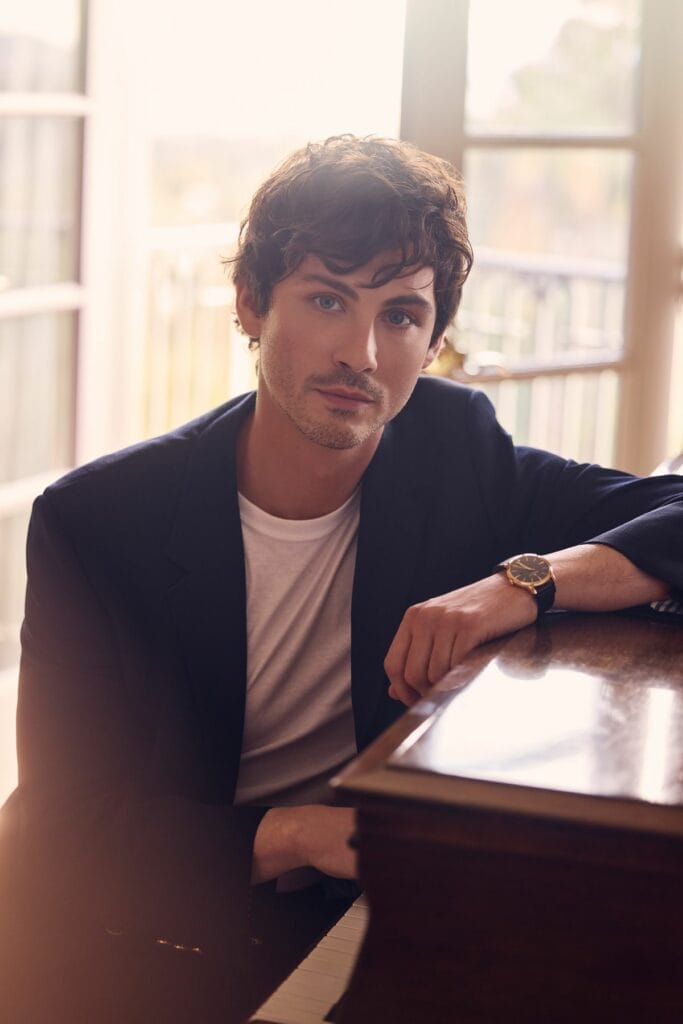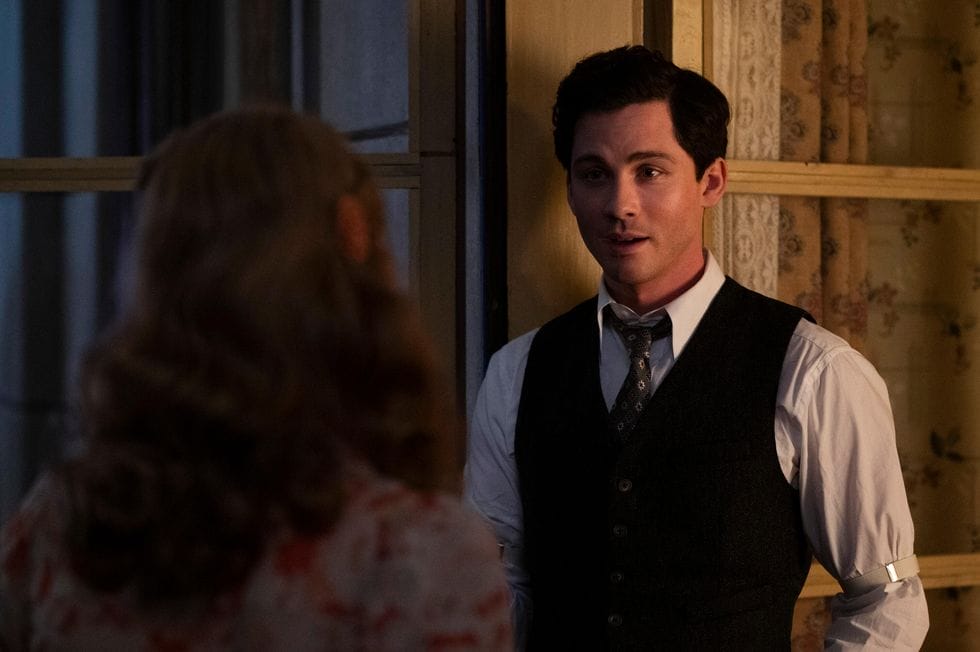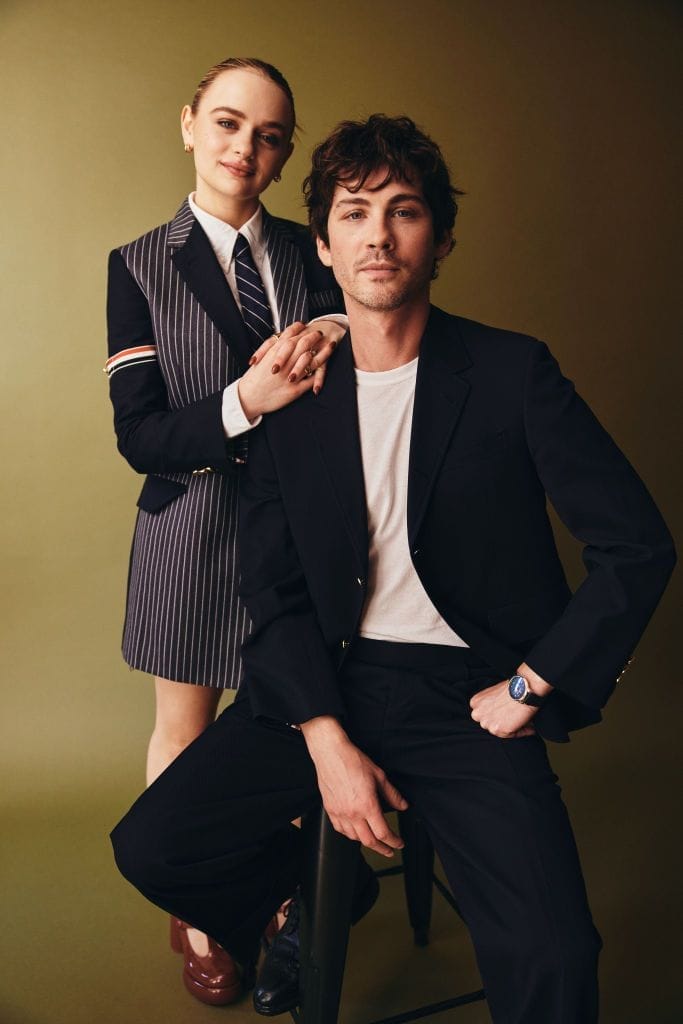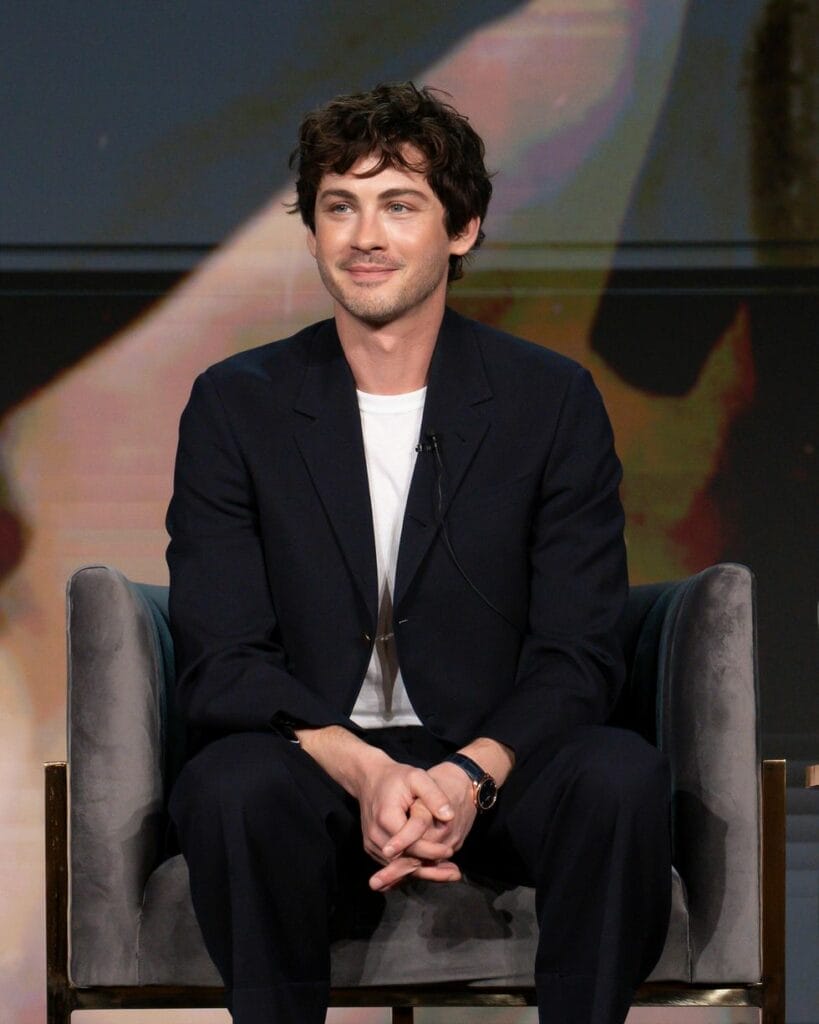Words by Max Gao
The star of Hulu’s We Were the Lucky Ones is solely focused on chasing authentic stories

DISNEY/RAMONA ROSALES
Having worked as an actor for over two decades, Logan Lerman has read his fair share of scripts that attempt to revisit and reexamine the horrors of the Holocaust. In retrospect, he says, many of those scripts have rung false at best—and read as exploitative at worst.
But when executive producers Erica Lipez and Thomas Kail first approached him a few years ago about starring in a TV adaptation of Georgia Hunter’s novel We Were the Lucky Ones, Lerman recognized an opportunity to bring a new perspective to the growing canon of harrowing tales about Holocaust survivors. Hunter’s 2017 bestseller—based on the lives of the author’s maternal grandfather’s family, and born out of over eight years of research into their disparate experiences—tells the story of the Kurcs, a Jewish family torn asunder at the start of World War II, and chronicles their fight to survive and reunite years later.
In the eight-episode limited series, which premiered last Thursday on Hulu, Lerman plays Addy Kurc, an electrical engineer and musician who has been living and working in Paris and finds himself unable to return to his family home in Radom, Poland. Unlike most of his loved ones, Addy is able to leave Europe on a boat of refugees looking to escape the impending Nazi occupation of France. His winding journey takes him to Casablanca, in Morocco, and then to Rio de Janeiro, where he spends years attempting to rebuild his life without his parents or his four siblings.
It’s a complex emotional journey that Lerman—best known for unwittingly becoming the face of adolescent angst for a generation with his work in The Perks of Being a Wallflower and the Percy Jackson films—relished undertaking. It is also arguably the role that holds the most personal significance for the 32-year-old, who has now spent the last quarter century working in front of—and increasingly behind—the camera.
“Addy was just focused on survival the whole time and got lucky to get out of Europe,” Lerman tells Harper’s Bazaar on a recent video call from Los Angeles. “But he grappled with the constant guilt of being a survivor and not knowing where his family was or if they were safe or okay. Every now and then, [he was] getting bits and pieces of news and updates about what was going on in Europe. Every good thing that happened to Addy along the way was also met with sadness and guilt, an intense longing for his family.”
The core tenet of family comes up often in discussions about We Were the Lucky Ones, which boasts an all-Jewish cast of actors to play the Kurcs. Not only is Addy based largely on Hunter’s grandfather, but Lerman, who was raised Jewish, was also able to draw from his own ancestry to create his interpretation of the character.
“The fact that it’s based in truth, in [Hunter’s] family history, was already really appealing to me,” says Lerman, who took a “leap of faith” and signed on to the project having read Hunter’s novel but without seeing a script. “Addy, in particular, really stood out because I haven’t seen the refugee story for Jewish Holocaust survivors explored in film or television before, and that resembled my [paternal] grandfather [Max]’s story. When he was a kid, he was a refugee that ended up in China. He grew up in China for most of his childhood, from when he was seven or eight until he was 18.”
The result is a powerful performance that weaves together the histories of two Jewish families connected by one of the darkest periods of human history. Once he officially signed on to the project, Lerman began to speak with Hunter, who serves as a co-executive producer on the adaptation, searching for little details that could help inform his portrayal of her grandfather. She peppered him with those, revealing that her grandfather was an optimistic family man who was a stickler for manners and spoke only French around the dinner table. He was also a very talented musician.

VLAD CIOPLEA
Logan Lerman in We Were the Lucky Ones
“Addy’s passion was in composing, and he had to put that aside for survival, and in some ways it helped him survive, because when he ended up on this boat full of refugees, his talent got him privileges on the boat to a higher class,” says Lerman, who was asked for the show to learn to play a couple of compositions his real-life character’s inspiration had written. “Learning his songs was a big part of tackling this character, and that took a lot of time. It was very difficult. I play music, but I’m not as talented as Addy, and he had to perform to survive in a lot of ways.”
At a Television Critics Association panel in February, Hunter said she “grew up very close” with her grandfather, who had changed his name to Eddy Courts and spoke perfect English by the time she knew him, but that he never spoke about his upbringing in Poland or that he came from a family of Jewish Holocaust survivors. It wasn’t until a year after he had died that Hunter discovered that part of her family’s history while working on a high school English assignment.
“He was so charismatic, so fun, always playing music in the house, super resourceful,” Hunter told reporters. “He made everything in the house by hand. He built a loom in his basement [and] wove the curtains that hung in the living room. He had clay busts that he molded of his children from a photograph that his brother Jacob took. He was just very forward-thinking.”
Whereas some actors may want some distance between themselves and the family of the real-life person they are trying to embody, Lerman saw the presence of Hunter and her family on set as an unexpected gift rather than a burden, especially when re-creating and retracing the steps of Addy’s journey.
“For instance, when I was filming the Alsina scenes—which is the boat that he ended up getting on to seek refuge in Brazil—[the production team] re-created the ship and the space where he became the leader of entertainment on this boat,” Lerman recalls. “Walking through the set with Georgia and her mom, re-creating their father and grandfather’s experience, elevated the experience for me as an actor and made it something more profound. It transcended normal filmmaking.”
This isn’t the first time Lerman has played an explicitly Jewish character, nor is it the first time he has explored the Holocaust in his work. Most recently, in his first TV role in 15 years, he starred opposite Al Pacino in Hunters, a revenge fantasy about a Nazi-hunting group in 1970s New York, which ran for two seasons on Prime Video. While he acknowledges that We Were the Lucky Ones, Hunters, and the 2014 war film Fury all share a through line—namely, the generational trauma of World War II—Lerman also sees each project as different from the next.
“The thing that I’m always looking for is newness in the character and wanting to try something different, so it’s not like I seek out these things,” he insists. He pursues only stories he likes and would want to watch himself. “But I have noticed a trend as an actor that when you do a project, people see you as that afterwards. So you tend to get a lot of similar-looking projects or characters, and I tend to want to move away from that.”
But has it been intentional for him to play Jewish characters? “We live in a time of real focus on authenticity, and I feel like now particularly, actors are receiving so many projects that are a reflection of their history or their family’s history and their culture, and I am seeing a lot more Jewish projects coming my way,” he admits. “My whole life, I don’t think I ever got any opportunities to play Jewish characters, and now I’m seeing a lot more of that. But as an actor, what excites me the most is exploring a new world or a new culture and diving deep into that. So it’s never been a focus or interest for me to explicitly play Jewish characters.”

ROBBY KLEIN//GETTY IMAGES
Lerman and Lucky Ones costar Joey King
It is also worth mentioning that Lerman himself doesn’t personally feel beholden to a particular faith or religion. “I’m so proud of my heritage and I love my culture and traditions, but I never had faith, ever, in my life,” he says with a self-deprecating laugh. “I was raised in a family that was pretty religious, but I wonder if they ever had faith either. I feel like they’ve all reformed over the years, but I was never a religious person. I was always an atheist at heart.”
We Were the Lucky Ones arrives at a particularly difficult and contentious time in the entertainment industry. Asked how he sees this show fitting into the larger conversation about what is happening in the world right now, especially amid the ongoing Israeli-Palestinian conflict, which has claimed thousands of lives and displaced millions of others, Lerman takes a decidedly more humanistic approach: “My experience in this production and intention when making it was to give face to the human toll in any conflict—and in this particular situation, a refugee seeking refuge in any country. I hope that this promotes empathy for those seeking refuge.”
Having worked for most of his life, Lerman has his sights set on the road ahead. On the March afternoon we speak, he politely confesses that he does not have very much perspective on his earliest experiences with fame, because he rarely spends any time thinking about his past. “I have my sights set on the future, mostly, just thinking about what’s next,” he says. “I don’t want to be stuck in something that feels too repetitive. But at the same time, as an actor or anybody in this industry, you’re kind of at the hands of how people consume things or what the business is at that period of time, and you have to evolve with it.”
It is anyone’s guess whether the continued evolution of Lerman’s career will include a return to Percy Jackson. Although he confesses he has yet to watch Disney’s new TV adaptation of the young-adult book series, Lerman says he hopes to rectify that soon. “It’s weird to be a part of something that’s readapted already. It’s how you know you’re getting old,” he jokes.
Since the latest iteration of Percy Jackson was announced in 2020, longtime fans have speculated about the likelihood of a cameo by Lerman—which seems improbable, given author Rick Riordan’s well-documented, pointed criticism of the films Lerman starred in, but not out of the realm of possibility. Lerman, for his part, would not rule out a return to the franchise, but he is also not holding his breath for an offer. “To be honest, I don’t know where I would fit into that world. I don’t think I would want to do that again,” he says.
Surely, I reason, there must be another demigod or a villain in that fantastical world that could be a better fit for him than Percy ever was. Lerman’s eyes briefly light up at this suggestion, only to dim when he admits he has not spoken with Riordan or the creative team behind the ne series.
“I can’t imagine that’s going to happen,” he says. “But I’m always open to conversations with people creatively. I’m open to any conversation for any project, as long as it’s good and there’s something that excites me about it. I usually listen to most people that want to work with me. If they do [want to work with me] is the question. But also, I’m just seeing when that right project comes around at the right time. I’m just in that stage now of hoping that people watch [We Were the Lucky Ones] and figuring out what the next one is.”

PICTUREGROUP
When I mention that the new, young faces of the Percy Jackson franchise—Walker Scobell, Leah Sava Jeffries, and Aryan Simhadri—have all expressed hesitation and trepidation to me about reaching out to him on social media, Lerman seems genuinely taken aback. “The idea that someone would be intimidated to talk with me is interesting,” he says with a sheepish smile. “I have messaged with Walker a few times online. He seems really sweet, and they’re so passionate about that world and that story. The show looks so good, so I’m happy for them.”
He adds: “To be honest, more than anything, [Percy] just opened up a lot of doors for me as an actor and gave me an opportunity to be a part of other projects after that—and be a part of them in ways where I could be helpful to finance them and get them made—and that was a really cool aspect of being part of that series. I’m really grateful for the experience.”
Over the years, Lerman has come to understand there is a trade-off involved in the kinds of stories he wants to tell. In the last decade, he has found a passion for producing and starring in independent films, including 2016’s Indignation and 2017’s The Vanishing of Sidney Hall. But to maintain the kind of name recognition that will convince financiers to back his passion projects, he knows he also needs to star in higher-profile projects that have broader, more mainstream appeal.
“I feel really fortunate to be working and to continue doing this. I feel really privileged and I take that with great responsibility. I’m like, ‘Okay, I’m one of the people that’s able to do this. Let’s try to do something great and add to the culture. Let’s try to add to it, build on it, and make things that will make people feel something, that people want to see, and hopefully [we’ll] get the chance to do it again,’ ” he says. “The relationship that we as audience members had with movies has changed a lot. They used to be so special, they used to be something different than they are now, and I’m like: How can we get back to that? I want to hopefully make things that are special, that mean something to audiences, that stand out and are events for them.”
This article originally appeared in harpersbazaar.com



